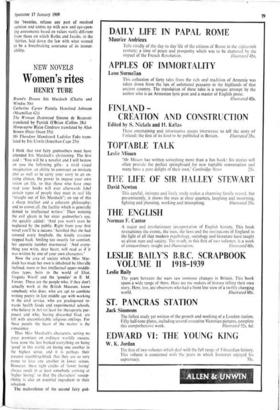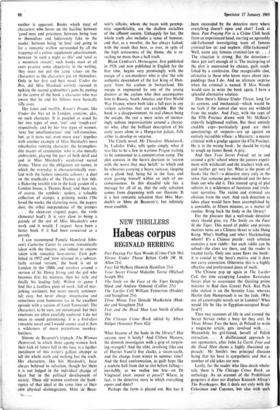NEW NOVELS
Women's rites
HENRY TUBE
Bruno's Dream Iris Murdoch (Chatto and Wind us 30s) Catherine Carter Pamela Hansford Johnson (Macmillan 42s) The Woman Destroyed Simone de Beauvoir translated by Patrick O'Brian (Collins 28s) Moravagine Blaise Cendrars translated by Alan Brown (Peter Owen 35s) Mr Theodore Mundstock Ladislav Fuks trans- lated by Iris Urwin (Jonathan Cape 25s) I think that two fairy godmothers must have attended Iris Murdoch's christening. The first said : 'You will be a novelist and I will bestow on you the following gifts: a vivid visual imagination, an ability to construct an intricate plot as well as to carry your story to an ex- citing climax, the power to impose your own vision on life, so that those who have once read your books will ever afterwards label certain types of people they meet in real life "straight out of Iris Murdoch"; on top of this a sharp intellect and a coherent philosophy; and to crown all, the facility which is generally denied to intellectual writers.' Then noticing the evil gleam in her sister godmother's eye, she quickly added: 'And you won't even be neglected by the public. Right from your first novel you'll be a success.' Satisfied that she had covered every loophole, the kindly creature stepped back. Smiling too sweetly for comfort, her opposite number murmured: 'And every- thing you write, dear heart, will read as if it was written by one of your own characters.'
Now the area of society which Miss Mur- doch has made her own is inhabited by liberally inclined, more or less intellectual upper-middle- class types, heirs to the world of Eliot, Virginia Woolf and the 'goodies' in E. M. Forster. These are the people who, if they don't actually work at the British Museum, know somebody who does, who are apt to combine writing poetry in late middle age with working in the civil service, who are predisposed to- wards health foods and experimental schools, who believe in Art (at least for therapeutic pur- poses) and who, having discarded God, arc left with uncomfortable religious inklings. For these people the heart of the matter is the conscience.
Thus Miss Murdoch's characters, setting no great premium on ordinary worldly success, have none the less banked everything on being 'good' in this world, on loving one another in the highest sense, and it is perhaps their greatest stumbling-block that they are so very prone to love one another in lower senses However, these tight circles of 'lower loving' always result in at least somebody arriving at 'higher loving,' so that the characters' suscep- tibility is also an essential ingredient in their salvation.
The malevolence of the second fairy god- mother is apparent. Books which treat, of characters who hover on the hairline between 'good'-ness and prissiness, between being true to themselves and ludicrously fake to the reader, between being 'in love' and going in for a romantic wallow surrounded by all the trappings of a colour supplement advertisement, between 'in such a night as this.' and 'cool as a mountain stream'; such books must at all costs practise some objectivity in the writing, they must not put the same values on the characters as the characters put on themselves. Only in her first and best novel, Under the Net, did Miss Murdoch entirely succeed in spiking the second godmother's guns by putting at the centre of the book a character who was aware that he and his fellows were basically silly asses.
Her latest and twelfth, Bruno's Dream, like Under the Net set in London, contains, alas, no such character. It is peopled as usual by her two types of men, 'wet' and 'rough-cast' respectively, and by her two types of women, 'sexy but unselfconscious' and 'self-conscious, but, as it turns out, even more sexy': together with another example of Miss Murdoch's most rebarbative running character, the hermaphro- dite master of ceremonies, who is also morally ambivalent, playing the part of both devil and god in Miss Murdoch's secularised sacred drama. There are the obligatory set scenes, in which the everyday is characteristically over- laid with the lushest romantic colours: a duel on the mudbanks of the Thames at low tide, a flickering torchlit trio in the back garden of a London house, a Thames flood; and there are, of course, the symbols: spiders, a valuable collection of stamps, a printing works ale loved the works, the clattering noise, the papery dust, the tribal independence of the printers . . . the clean-cut virginal paper, the virile elemental lead). It is very close to being a parody of the rest of Miss Murdoch's own work and it would, I suspect, have been a better book if it had been coneeived as , a parody.
I can recommend Pamela Hansford John- son's Catherine Carter to anyone romantically taken with the theatre, and indeed to anyone taken with romantic love-stories. First pub- lished in 1952 and 'now reissued in a substan- tially revised version,' the book is set in London in the 1880s and revolves around a version of Sir Henry Irving and the girl who becomes first his mistress, then his wife and finally his leading lady. Within its genre I find this a faultless piece of work, full of tear- jerking sentiment, but never merely sentimen- tal; easy, but never cheap; imaginative and sometimes even humorous (as in the excellent episode with a version of Lord Tennyson). The characters, to be sure, are stereotyped, but their emotions are often carefully explored. I do not mean to sound patronising; it is a first-class romantic novel and I would sooner read it than a wilderness of more pretentious monkey- business.
Simone de Beauvoir's triptych, The Woman Destroyed, in which three ageing women look their lack of future full in the face, is. a further instalment of this writer's gallant altermit. to tell the whole truth and nothing but the truth. Her characters, like Iris Murdoch's, have always believed in salvation, though for -them it is not lodged in the individual change of heart but in the political- -development of society. These old women confront theliank- ruptcy of that ideal at the Same tiinasThèir own physical disintegration.. Mme -de Beau-
voles villains, whom she treats with peremp-
tory superficiality, are- shallow socialites of the affluent society. nhappily for her, the whole truth also includes a sense of humour, and that, as a novelist, she has always lacked, with the result that here, as ever, in spite of the high seriousness of the theme, she is re- vealing no more than a half-truth.
Blaise Cendrars's Moravogine, first published in 1926 and now published in English for the first time, begins very promisingly with, the escape of a sex-murderer who is also `the sole authentic descendant of the last King of Hun- gary' from his asylum in Switzerland. His escape is engineered by one of the young doctors at the asylum who then accompanies him to Russia, South America and First World War France, where both take a full part in any violent activities that, are available. But the book is a disappointment, its real climax being the escape, the rest a mere series of increas- ingly tedious improvisations around a charac- ter who, after the brilliant description of his early years alone in a Hungarian palace, fails either to develop or surprise.
The Czech novel, Mr Theodore Mundstock, by Ladislav Fuks, tells quite simply what it was like to be a Jew in wartime' Prague waiting to be summoned to a concentration camp. The plot consists in the hero's decision to 'reason with the worst that may befall,' to which end he rehearses carrying a heavy suitcase, sleeping on a plank bed, being hit in the face, and even gassing himself within an inch of un- consciousness. In this dreadful tale lies a message for all of us, that the only salvation comes from dispensing with our illusions. It is a less romantic salvation than Miss Mur- doch's or Mme de Beauvoir's, but infinitely more credible.



































 Previous page
Previous page